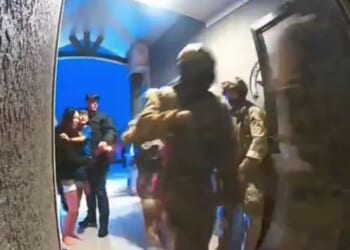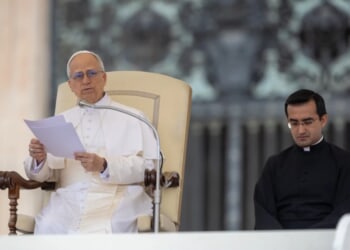Rankings are often controversial. For example, the latest Michelin Guide considers the best two restaurants in Washington, D.C., to be minibar and Jônt, whereas the magazine Washingtonian chooses Albi and Dо̄gon. And while U.S. News & World Report ranks Princeton the country’s number one “national university,” the QS World University Rankings call MIT the top institution of higher education in the world. All of this is to say that when a friend or a source or a bot informs you that someone or something is “the best,” there’s usually reason for skepticism.
But I’m going to go out on a limb here and state without reservation that if you wish to learn Ancient Greek or Latin, the finest teachers and the finest program in the United States are to be found at Ralston College in Savannah. A small upstart institution devoted to humanistic inquiry—its main enterprise so far is an M.A. in the Humanities—Ralston made a splash recently with some talks at a college symposium held in part at the nearby Telfair Academy, including a characteristically sensational keynote by The New Criterion’s visiting critic Douglas Murray titled “Reconstructing Our Culture” and a wonderful address by the recent graduate Mari Otsu that had “a moving viral moment,” as The Free Press put it. Most importantly, however, Ralston, for which its founding president, Stephen Blackwood, began raising funds in 2006 and which was incorporated in the state of Georgia in 2010, has now received word from the New England Commission of Higher Education that it has been granted candidacy for accreditation—the penultimate step in the accreditation process. This is a major milestone even if you believe, as I do, that the American system of accreditation needs a thorough overhaul.
There is more to Ralston than Greek and Latin. But nothing sets Ralston apart more than its professors’ ability to take young people who do not know these languages and, in a matter of months, get them to speak, read, and write with creative fluency. As I have repeatedly noted on my many visits to Ralston since 2022, the ability of even the median student to go from nothing to ad-lib conversation, in Ancient Greek and without notes, about matters both philosophical and quotidian exceeds what teachers at so-called elite institutions can get all but the most remarkable pupils to do after four long years of instruction.
Of course, Ralston’s success requires the right sorts of students to apply and then to apply themselves. But first of all, it requires extraordinary teachers. To my knowledge, no other college or university in the world has three faculty members who are fluent—actually fluent—in Ancient Greek or Latin, as well as being brilliant in the classroom.
Allow me to introduce Joseph Conlon, David Butterfield, and Daniel Gallagher. Conlon, about whose Greek class I wrote in City Journal over two years ago, is Professor of Classics and Director of Ralston’s Greek Program. He is American but chooses to speak as little English as possible. His linguistic gifts are off the charts: I doubt there is anyone else in the country (and very few in the whole world) with such easy fluency in both Ancient Greek and Latin—not to mention in Modern Greek, Russian, and a host of other tongues. Though primarily a teacher, he is also the author of a forthcoming commentary on a Latin play from the early second century B.C., Plautus’s Persa, and a translation into English of a nineteenth-century (A.D.) novel, Alexandros Papadiamantis’s Ἡ Γυφτοπούλα. While Conlon’s predilection for antiquity leads him to some indefensible views—he once told a reporter from the Financial Times, “The jury is out over whether Shakespeare is important”—I have never seen anyone work magic like his in a language classroom. I have known Conlon since his arrival at Princeton as a graduate student in classics in 2011. His students are far more fortunate in their teacher than he was in his.
Then there is Butterfield, Professor of Latin and Director of Ralston’s Latin Program. Also an outstanding teacher, Butterfield has until now been known mostly for his writings. A prolific scholar whose technical skill, broad knowledge, and joie de vivre make him one of the leading Latinists of his generation, Butterfield has a popular touch that is unusual for someone who first made a name for himself with articles like “Sigmatic Ecthlipsis in Lucretius.” Last year, he made waves when he did the unthinkable: resigning from a lifetime appointment in the Faculty of Classics at Cambridge because of the venerable institution’s precipitous decline, which he documented in brief but stinging terms in a widely read article in The Spectator. And then he joined Ralston: “a most natural, and indeed joyous, step to take,” as he wrote for The New Criterion. Also a senior fellow at the Pharos Foundation, Butterfield remains the literary editor of The Critic, a contributing editor of The Spectator (a book-length history of which, 10,000 Not Out, he published in 2020), and the inspired editor-in-chief of the online classics journal Antigone, which The New Criterion saluted in 2022. (Disclosure: my wife is part of Antigone’s “team.”) I have known Butterfield for close to twenty years and am fiercely aware of just how fortunate his students are to be able to learn from someone of such prodigious talent.
Finally, Gallagher, who holds the title Lecturer in Literature and Philosophy. The author of articles in The American Spectator and in such Catholic publications as Crisis Magazine, The Catholic World Report, and The Catholic Thing, he used to be Professor of the Practice (i.e., the practice of Latin) in the classics department at Cornell and was, before that, a member of the Latin language department in the Vatican’s Secretariat of State, where he produced documents in the language for Popes Benedict XVI and Francis. Although my personal acquaintance with Gallagher is recent, I have known of him for a long time. For one thing, he taught my wife, back when she was an undergraduate, in two of the Paideia Institute’s “Living Latin” programs, one in Rome and the other in Paris; for another, he is a protégé of the late Fr. Reginald Foster (a.k.a. Reginaldus), an extraordinarily quirky and charismatic Vatican Latinist and teacher who achieved unlikely fame thanks to profiles in many major publications, including this one. And yet again, how fortunate Ralston students are to have unfettered access to someone of this caliber.
Many people have glorious things to say about Ralston. Take the distinguished critic Mark Bauerlein, an emeritus professor of English at Emory who sits on Ralston’s board of visitors. He has written at least three articles lauding the school. And in late April, two classicists who are not associated with Ralston commented specifically on the college’s classical language pedagogy: Alex Petkas, in a piece with the amusing title “Eating Harvard’s Lunch,” and Jaspreet Singh Boparai (“A Classical Insurgency”). But none of these commentators mentions Conlon, Butterfield, or Gallagher by name. A recently posted piece on Ralston’s website states, “Classical languages can restore modern universities,” which I like to think is true—but only if there are people who can teach them, truly teach them.
Is caring so much about Ancient Greek and Latin a luxury? At some level, yes. But we are lost as a civilization if no one can properly read Homer, Plato, Cicero, and Vergil—and if no one in Savannah even knows how to translate Oglethorpe’s original motto for the colony of Georgia, Non sibi sed aliis. Furthermore, excellence is to be celebrated, whatever form it may take, and Ralston’s classics crew is, without doubt, excellent. Indeed, it’s the best.














